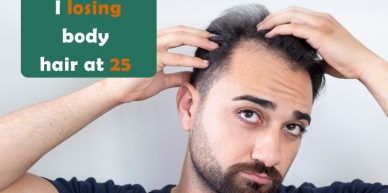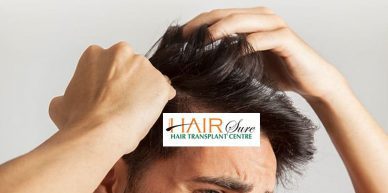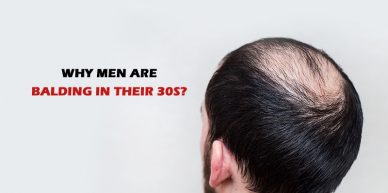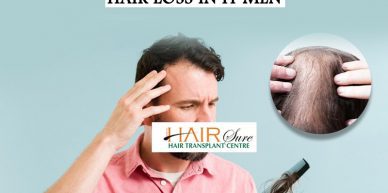Hair transplants are a cosmetic procedure for both men and women experiencing hair loss, often due to hereditary male or female pattern baldness. Hormonal changes, medical conditions, or trauma can also cause hair loss. The procedure involves taking hair follicles...
Why age is an important factor in your hair transplant success
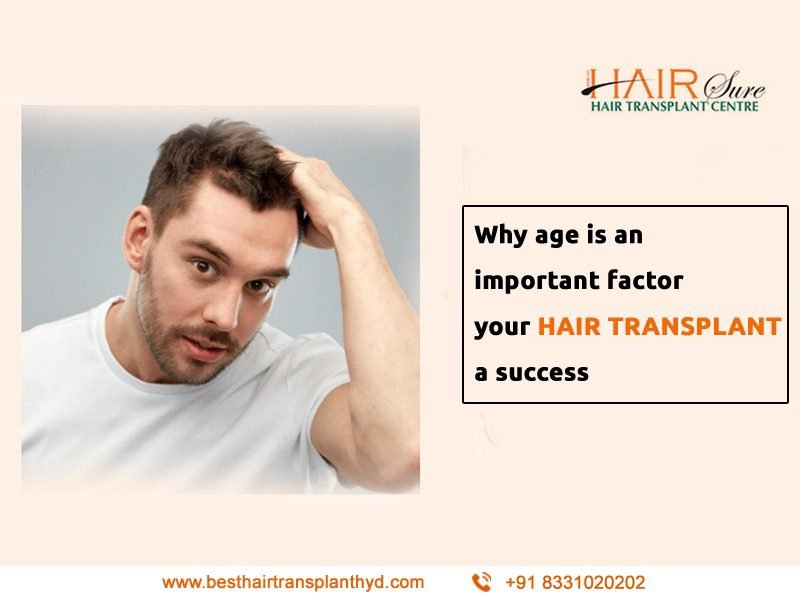
Age is a crucial factor in determining the success of a hair transplant, with the best age for both men and women being 40 years old. Other factors contributing to the success of a hair transplant include:
- Choosing a good doctor.
- Selecting the right technique.
- Correct diagnosis and planning.
- Extracting the graft without damaging it.
The appearance of the patient’s hair after the transplant is often judged, and older patients may have thinner, weaker hair follicles that are less likely to survive. Therefore, it is essential to consult with an experienced specialist before undergoing any hair transplant procedure.

Why age is an important factor in your hair transplant?
- Donor hair quality:
- The success of a hair transplant depends on the availability of healthy donor hair, typically from the back and sides of the head.
- In general, younger individuals tend to have a better supply of high-quality donor hair that is less prone to thinning or balding.
- Older individuals may have thinner or less dense donor hair, which can limit the number of grafts that can be transplanted and the overall success of the procedure.
- Progressive hair loss:
- Hair loss is often a progressive condition, and the pattern of balding can continue to evolve with age.
- Suppose a person undergoes a hair transplant at a younger age. In that case, there is a risk that they may continue to experience hair loss and require additional surgeries to maintain the desired appearance.
- It’s essential to consider the long-term outlook when planning a hair transplant.
- Realistic expectations:
- The patient’s expectations play a role in the outcome of a hair transplant.
- Younger individuals may have higher expectations for a full head of hair, which can be challenging to achieve with limited donor hair and progressive hair loss.
- Patients need to be aware of the procedure’s limits and have reasonable expectations.

- Health and healing:
- Younger individuals tend to have better overall health and faster healing capabilities, which can positively influence the outcome of a hair transplant.
- However, older individuals can still be good candidates for the procedure, but their general health and ability to heal may play a role in determining the success of the surgery.
- Stability of hair loss:
- Hair loss typically stabilizes as you get older.
- If you’re in your early 20s and your hair loss pattern has been stable for an extended period, it might be a better time to consider a hair transplant.
- Stability in hair loss helps ensure that the transplanted hair maintains a consistent appearance.
- Thinning and miniaturization:
- In some cases, the transplanted hair may be resistant to the effects of male pattern baldness, but the surrounding, non-transplanted hair may continue to thin and miniaturize as you age.
- Can affect the overall appearance and may require further treatments or adjustments to maintain a consistent look.
- Long-term outlook:
- A successful hair transplant should consider the long-term outlook.
- Surgeons will assess your age, the pattern and extent of your hair loss, and your goals to design a treatment plan that takes into account potential future hair loss.
- Recovery time:
- The speed of recovery from a hair transplant is influenced by various factors, including your overall health, the skill of the surgeon, and the specific technique used.
- While younger individuals tend to heal faster, it’s important not to rush the recovery process.
- It’s essential to follow the postoperative care guidelines for the best results.
- Follow-up and maintenance:
- Hair transplants may require ongoing maintenance and follow-up procedures, especially as you age and hair loss continues.
- Regular consultations with your hair transplant specialist are essential to address any changes and to adjust the plan as needed.
Age significantly impacts the success of a hair transplant, as it affects donor hair quality, quantity, hair loss progression, expectations, and overall health. A well-planned procedure should consider the patient’s age and long-term needs to achieve optimal results. Consulting with a qualified hair transplant specialist is crucial for personalized recommendations. The success and longevity of a hair transplant depend on factors like natural hair loss progression, donor hair quality and quantity, and surgeon skill. Working closely with a reputable specialist ensures the transplanted hair remains a natural part of the individual’s appearance as they age.
Common reasons for hair loss in young individuals and preventive measures include:
- Genetic factor:
- The majority of hair loss cases are caused by hereditary alopecia, also known as androgenetic alopecia.
- It can affect both men and women and usually presents in a specific pattern.
- Prevention is challenging, but early intervention with medications like minoxidil and finasteride can slow down the progression.
- Stress:
- Loss of hair may result from prolonged stress.
- Telogen effluvium, also known as this form of hair loss, is typically transient.
- Managing stress through relaxation techniques, exercise, and a balanced lifestyle can help prevent this type of hair loss.
- Poor nutrition:
- A lack of essential nutrients, particularly protein, iron, and vitamins, can lead to hair loss.
- Maintaining a balanced diet and addressing any nutritional deficiencies can help prevent hair loss.
- Hairstyling and treatments:
- Excessive use of heat, chemicals, tight hairstyles (e.g., cornrows), and hair treatments can damage hair follicles and lead to hair loss.
- Avoiding harsh treatments and adopting more gentle hair care practices can help prevent this type of hair loss.
- Medical conditions:
- Certain medical conditions, such as thyroid disorders, polycystic ovarian syndrome (PCOS), and autoimmune diseases, can cause hair loss.
- Managing the underlying medical condition with the help of a healthcare professional is crucial for preventing hair loss.
- Medications:
- Hair loss is a potential adverse effect of some drugs.
- If you suspect your medication is causing hair loss, consult your doctor.
- They may adjust your treatment or recommend alternatives.
- Hormonal imbalances:
- Hormonal imbalances, for instance, during pregnancy or resulting from hormonal disorders, can lead to temporary hair loss.
- Balancing hormones, if necessary, is key to preventing hair loss in these cases.
- Traction alopecia:
- Traction alopecia is hair loss caused by continuous pulling on the hair, often due to tight hairstyles or excessive use of hair extensions.
- Avoiding styles that put stress on the hair follicles can prevent this type of hair loss.
- Smoking and substance abuse:
- Smoking and substance abuse can contribute to hair loss.
- Quitting these habits can improve hair health and prevent further loss.
- Adequate hair care:
- Maintaining a regular hair care routine that includes gentle washing, conditioning, and avoiding excessive brushing or combing can help prevent hair damage and breakage.
Reversing hair loss requires addressing underlying causes and adopting a holistic approach to hair care and overall health. If experiencing significant hair loss at a young age, consult a healthcare professional or a dermatologist for a proper diagnosis and a tailored treatment plan.
At Cyber HairSure, we are dedicated to a policy of offering patients unmatched services. At Cyber HairSure Advanced Hair Transplant Clinic, all of your hair-related worries can be expertly resolved, and you can rest assured that your smiles won’t flinch again. Enter Cyber HairSure and exit with the desired appearance.
Cyber HairSure can assist in determining the precise reason for hair loss and offer suitable treatment solutions that are suited to the requirements of the individual. Always consult a medical expert when you have questions about your health. Always consult a medical expert when you have questions about your health.
We, at Cyber HairSure, are committed to providing matchless services to all our patients. All your concerns regarding hair problems can be flawlessly sorted at Cyber HairSure Advanced Hair Transplant Clinic, guaranteeing that you will be left with smiles that won’t fall again. Walk into Cyber HairSure and walk back with the look that you desire. Call 040 49540202 / 8331020202 or email us at cyberhairsure@gmail.com to book your consultation. Visit our website, Hair Transplant Clinic, to know more.




